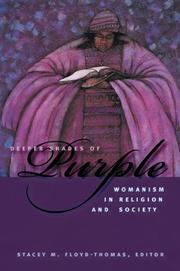| Listing 1 - 7 of 7 |
Sort by
|
Book
ISBN: 0230113931 0230615112 1282993070 1349378798 9786612993077 Year: 2010 Publisher: Basingstoke Palgrave Macmillan US
Abstract | Keywords | Export | Availability | Bookmark
 Loading...
Loading...Choose an application
- Reference Manager
- EndNote
- RefWorks (Direct export to RefWorks)
Book
ISBN: 9004352651 9789004352650 9789004352186 900435218X Year: 2017 Publisher: Leiden Boston
Abstract | Keywords | Export | Availability | Bookmark
 Loading...
Loading...Choose an application
- Reference Manager
- EndNote
- RefWorks (Direct export to RefWorks)
Ecowomanism emerges from third wave womanist thought that emphasises interdisciplinary, interreligious and intergenerational dialogue as approaches to environmental ethics. Ecowomanism unashamedly validates the importance of the perspectives of women of color, and especially the voices, perspectives and contributions of women of African descent.
Human ecology --- Ecotheology. --- Womanist theology. --- Womanism. --- Religious aspects.
Book
ISBN: 1608336662 9781608336661 9781626982017 Year: 2017 Publisher: Maryknoll
Abstract | Keywords | Export | Availability | Bookmark
 Loading...
Loading...Choose an application
- Reference Manager
- EndNote
- RefWorks (Direct export to RefWorks)
African American women --- Womanist theology --- Womanism --- Ecotheology --- Aesthetics --- Religion. --- Religious aspects.
Book
ISBN: 0230115209 9780230115200 Year: 2011 Publisher: New York Palgrave Macmillan
Abstract | Keywords | Export | Availability | Bookmark
 Loading...
Loading...Choose an application
- Reference Manager
- EndNote
- RefWorks (Direct export to RefWorks)
"Faith, Feminism, and Scholarship engages third wave Womanist, Latina, Asian, Black and White feminists discussing their approaches to religious scholarship, teaching strategies, and participation in communal and social activism. The volume looks at major themes in feminist religious scholarship including our identities as scholars and activists, what lead us to ministry as scholars, and how our work is shaped by our faith commitments. The authors engage feminist and womanist theory, post-colonial thought, critical race theory, gender studies as well as using personal narrative to describe and enliven tensions in these theories and practice including pedagogical models of transformation."--Publisher's website.
Book

Year: 2006 Publisher: Reston, Va. : U.S. Geological Survey,
Abstract | Keywords | Export | Availability | Bookmark
 Loading...
Loading...Choose an application
- Reference Manager
- EndNote
- RefWorks (Direct export to RefWorks)
Land use --- Aerial photography in land use --- Vegetation boundaries


ISBN: 0814728650 0814727522 Year: 2006 Publisher: New York NYU Press
Abstract | Keywords | Export | Availability | Bookmark
 Loading...
Loading...Choose an application
- Reference Manager
- EndNote
- RefWorks (Direct export to RefWorks)
Womanist approaches to the study of religion and society have contributed much to our understanding of Black religious life, activism, and women's liberation. Deeper Shades of Purple explores the achievements of this movement over the past two decades and evaluates some of the leading voices and different perspectives within this burgeoning field.Deeper Shades of Purple brings together a who's who of scholars in the study of Black women and religion who view their scholarship through a womanist critical lens. The contributors revisit Alice Walker's definition of womanism for its viability for the approaches to discourses in religion of Black women scholars. Whereas Walker has defined what it means to be womanist, these contributors define what it means to practice womanism, and illuminate how womanism has been used as a vantage point for the theoretical orientations and methodological approaches of Black women scholar-activists.Contributors: Karen Baker-Fletcher, Katie G. Cannon, M. Shawn Copeland, Kelly Brown Douglas, Carol B. Duncan, Stacey M. Floyd-Thomas, Rachel Elizabeth Harding, Rosemarie Freeney Harding, Melanie L. Harris, Diana L. Hayes, Dwight N. Hopkins, Ada María Isasi-Díaz, Cheryl A. Kirk-Duggan, Kwok Pui-Lan, Daisy L. Machado, Debra Majeed, Anthony B. Pinn, Rosetta Ross, Letty M. Russell, Shani Settles, Dianne M. Stewart, Raedorah Stewart-Dodd, Emilie M. Townes, Traci C. West, and Nancy Lynne Westfield.


ISBN: 9780814728659 9780814727522 Year: 2006 Publisher: New York, N.Y. New York University Press
Abstract | Keywords | Export | Availability | Bookmark
 Loading...
Loading...Choose an application
- Reference Manager
- EndNote
- RefWorks (Direct export to RefWorks)
| Listing 1 - 7 of 7 |
Sort by
|

 Search
Search Feedback
Feedback About UniCat
About UniCat  Help
Help News
News